#Tennessee Department of Education
Text
Leave a Comment about the TISA Rules
The Tennessee PTA wants to make sure that all stakeholders are aware of opportunities to be involved in the process of creation and crafting the Tennessee Investment in Student Achievement (TISA) act. The Tennessee Department of Education recently released the TISA rules for implementation.
These rules can be found at https://www.tn.gov/content/dam/tn/education/legal/TISA_Rules_Final_Draft-6-6-2022.pdf.
Additional information on the rules can be found on the DOE Funding Website https://www.tn.gov/education/tnedufunding.html.
The Tennessee Department of Education is asking for public input on these rules. Please take a moment to review the rules, and then send any feedback that you have to [email protected] by August 2nd. Your voice is an important part of ensuring the future success of all students through proper state funding. If you have any questions about these rules, please don't hesitate to reach out to the Tennessee PTA at [email protected] so that we can work together to make sure all students have the ability to succeed.
0 notes
Text
Tennessee HBCU Partnership Empowers Incarcerated Students' Historical Graduation Inside Prison
Six men, incarcerated at the Northwest Correctional Complex (NWCX), made history in November 2023, as they proudly marched across the stage, receiving their Bachelor of Science in Business degree from Lane College an HBCU. This monumental achievement is a testament to the Tennessee Higher Education Initiative (THEI), which continues to blaze a trail, offering education to those behind the prison…

View On WordPress
#Education#HBCU#Incarcerated Students#Lane College#Prison Education#Prison Reform#Tennessee Department of Correction#Tennessee Higher Education in Prison Initiative#THEI
0 notes
Text
Things Biden and the Democrats did, this week #9
March 9-15 2024
The IRS launched its direct file pilot program. Tax payers in 12 states, Florida, New Hampshire, Nevada, South Dakota, Tennessee, Texas, Washington, Wyoming, Arizona, Massachusetts, California and New York, can now file their federal income taxes for free on-line directly with the IRS. The IRS plans on taking direct file nation wide for next year's tax season. Tax Day is April 15th so if you're in one of those states you have a month to check it out.
The Department of Education’s Office of Civil Rights opened an investigation into the death of Nex Benedict. the OCR is investigating if Benedict's school district violated his civil rights by failing to protect him from bullying. President Biden expressed support for trans and non-binary youth in the aftermath of the ruling that Benedict's death was a suicide and encouraged people to seek help in crisis
Vice President Kamala Harris became the first sitting Vice-President (or President) to visit an abortion provider. Harris' historic visit was to a Planned Parenthood clinic in St. Paul Minnesota. This is the last stop on the Vice-President's Reproductive Rights Tour that has taken her across the country highlighting the need for reproductive health care.
President Biden announced 3.3 billion dollars worth of infrastructure projects across 40 states designed to reconnect communities divided by transportation infrastructure. Communities often split decades ago by highways build in the 1960s and 70s. These splits very often affect communities of color splitting them off from the wider cities and making daily life far more difficult. These reconnection projects will help remedy decades of economic racism.
The Biden-Harris administration is taking steps to eliminate junk fees for college students. These are hidden fees students pay to get loans or special fees banks charged to students with bank accounts. Also the administration plans to eliminate automatic billing for textbooks and ban schools from pocketing leftover money on student's meal plans.
The Department of Interior announced $120 million in investments to help boost Climate Resilience in Tribal Communities. The money will support 146 projects effecting over 100 tribes. This comes on top of $440 million already spent on tribal climate resilience by the administration so far
The Department of Energy announced $750 million dollars in investment in clean hydrogen power. This will go to 52 projects across 24 states. As part of the administration's climate goals the DoE plans to bring low to zero carbon hydrogen production to 10 million metric tons by 2030, and the cost of hydrogen to $1 per kilogram of hydrogen produced by 2031.
The Department of Energy has offered a 2.3 billion dollar loan to build a lithium processing plant in Nevada. Lithium is the key component in rechargeable batteries used it electric vehicles. Currently 95% of the world's lithium comes from just 4 countries, Australia, Chile, China and Argentina. Only about 1% of the US' lithium needs are met by domestic production. When completed the processing plant in Thacker Pass Nevada will produce enough lithium for 800,000 electric vehicle batteries a year.
The Department of Transportation is making available $1.2 billion in funds to reduce decrease pollution in transportation. Available in all 50 states, DC and Puerto Rico the funds will support projects by transportation authorities to lower their carbon emissions.
The Geothermal Energy Optimization Act was introduced in the US Senate. If passed the act will streamline the permitting process and help expand geothermal projects on public lands. This totally green energy currently accounts for just 0.4% of the US' engird usage but the Department of Energy estimates the potential geothermal energy supply is large enough to power the entire U.S. five times over.
The Justice for Breonna Taylor Act was introduced in the Senate banning No Knock Warrants nationwide
A bill was introduced in the House requiring the US Postal Service to cover the costs of any laid fees on bills the USPS failed to deliver on time
The Senate Confirmed 3 more Biden nominees to be life time federal Judges, Jasmine Yoon the first Asian-America federal judge in Virginia, Sunil Harjani in Illinois, and Melissa DuBose the first LGBTQ and first person of color to serve as a federal judge in Rhode Island. This brings the total number of Biden judges to 185
#Thanks Biden#Joe Biden#Democrats#politics#US politics#good news#nex benedict#abortion#taxes#climate change#climate action#tribal communities#lithium#electronic cars#trans rights#trans solidarity#judges
357 notes
·
View notes
Text
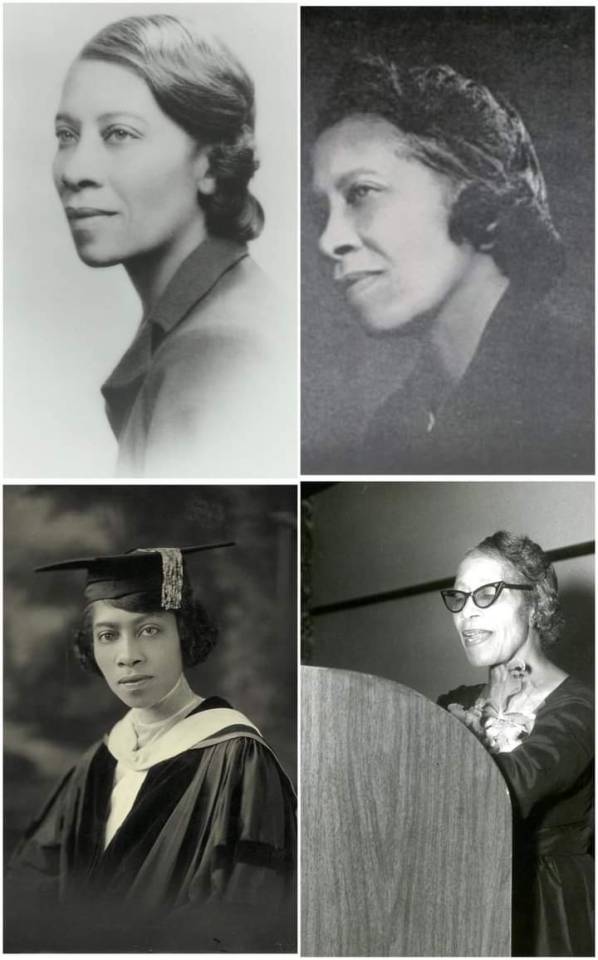
Eva Beatrice Dykes (13 August 1893 – 29 October 1986) was a prominent educator and the third black American woman to be awarded a PhD.
Dykes was born in Washington, D.C., on August 13, 1893, the daughter of Martha Ann (née Howard) and James Stanley Dykes. She attended M Street High School (later renamed Dunbar High School). She graduated summa cum laude from Howard University with a B.A. in 1914. While attending Howard University, where several family members had studied, Eva was initiated into the Alpha chapter of Delta Sigma Theta. At the end of her last semester she was awarded Alpha Kappa Alpha Sorority Incorporated's first official scholarship. After a short stint of teaching at Walden University in Nashville, Tennessee, Dykes attended Radcliffe College graduating magna cum laude with a second B.A. in 1917 and a M.A in 1918. While at Radcliffe she was elected to Phi Beta Kappa. In 1920 Dykes began teaching at Dunbar High School, and in 1921 she received a PhD from Radcliffe (now a part of Harvard University). Her dissertation was titled “Pope and His influence in America from 1715 to 1815”, and explored the attitudes of Alexander Pope towards slavery and his influence on American writers. Dykes was the first black American woman to complete the requirements for a doctoral degree, however, because Radcliffe College held its graduation ceremonies later in the spring, she was the third to graduate, behind Sadie Tanner Mossell Alexander (1921, University of Pennsylvania) and Georgiana R. Simpson (1921, University of Chicago).
After her graduation from Radcliffe in 1921, Dykes continued to teach at Dunbar High School until 1929 when she returned to Howard University as a member of the English Faculty. An excellent teacher, Dykes won a number of teaching awards during her 15 years of service at Howard University. Her publications include Readings from Negro Authors for Schools and Colleges co-authored with Lorenzo Dow Turner and Otelia Cromwell (1931) and The Negro in English Romantic Thought: Or a Study in Sympathy for the Oppressed (1942). In 1934 Dykes began writing a column in the Seventh-day Adventist periodical Message Magazine, this continued until 1984.
In 1920 Dykes joined the Seventh-day Adventist Church, and in 1944 she joined the faculty of the then small and unaccredited Seventh-day Adventist Oakwood College in Huntsville, Alabama, as the Chair of the English Department. She was the first staff member at Oakwood to hold a doctoral qualification and was instrumental in assisting the college to gain accreditation. Dykes retired in 1968 but returned to Oakwood to teach in 1970 and continued until 1975. In 1973 the Oakwood College library was named in her honor and in 1980 she was made a Professor Emerita. In 1975 the General Conference of the Seventh-day Adventist Church presented Dykes with a Citation of Excellence honouring her for an outstanding contribution to Seventh-day Adventist education. Dykes died in Huntsville on October 29, 1986, at the age of 93.
#black history#black literature#black tumblr#black excellence#black community#civil rights#black history is american history#black girl magic#blackexcellence365
104 notes
·
View notes
Text

Bessie Smith experienced a "wretched childhood". Her parents and a brother died while she was young. Her older sister Viola took charge of caring for her siblings and as a consequence, Bessie was unable to gain an education. To earn money for her impoverished household, Bessie and her brother Andrew busked on the streets of Chattanooga. She sang and danced as he played the guitar. They often performed on street corners for pennies, and their habitual location was in front of the White Elephant Saloon at Thirteenth and Elm streets, in the heart of the city's African-American community.
Bessie began forming her own act around 1913. Working a heavy theater schedule during the winter and performing in tent shows the rest of the year, Smith became the highest-paid black entertainer of her day and began traveling in her own 72-foot-long railroad car. Columbia Records publicity department nicknamed her "Queen of the Blues", but the national press soon upgraded her title to "Empress of the Blues". Smith's music stressed independence, fearlessness, and sexual freedom, implicitly arguing that working-class women did not have to alter their behavior to be worthy of respect.
Bessie Smith was born on April 15, 1894 in Chattanooga, Tennessee and died on September 26, 1937 in Clarksdale, Mississippi from critical injuries she suffered in a car crash at the age of 43
#bessie smith#love#music legend#vintage#tennessee#mississippi#queen of blues#the empress of blues#black lives#singer#actress
24 notes
·
View notes
Text
Thomas Fountain Blue
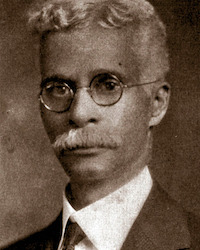
Thomas Fountain Blue, the first African American to head a public library in the United States, was also a civic, educational, and religious leader. Blue was born in Farmville, Virginia, on March 6, 1866, to Noah Blue, a carpenter, and Henry Ann Crawley Blue. They were parents of two other children, Alice Blue and Charles Blue.
Blue enrolled in Hampton Institute in Hampton, Virginia, in 1885 and graduated in 1888. In 1894, he enrolled in Richmond Theological Seminary (now Virginia Union University) in Richmond, Virginia, finishing in 1898 with a Bachelor of Divinity degree. One week later, when the United States declared war on Spain after the sinking of the USS Maine off the coast of Cuba, touching off the Spanish-American War, Blue joined the Sixth Virginia Volunteers battalion comprising African American soldiers and was stationed first in Camp Poland in Tennessee and later at Camp Haskell in Georgia.
In 1905, Blue was selected to lead the Western Branch Library of the Louisville Free Public Library on South 10th and Chestnut Street, the first Carnegie Library in the nation to serve African American patrons with an exclusively African American staff. The facility cost $31,024.31 to build and when completed had over 4,000 books and 53 periodicals.
In 1914, Blue opened Louisville’s second Carnegie Library for African Americans, the Eastern Branch Library. During World War I, Blue was drafted, left the branch, and was appointed the Education Secretary at Camp Zachary Taylor in Louisville, one of sixteen national Army training camps created across the nation. Blue worked with Black troops who mostly had supporting and laboring roles in the United States.
After the war ended in 1918, Blue returned to Louisville, and a year later, in 1919, he was named head of the “Colored Department” for the city’s public library system and supervised eight African American assistants. The Colored Department was the first in the United States to have a staff which served multiple Black library branches.
In 1922, Blue was a presenter at the American Library Association Conference in Detroit, Michigan, where he gave a paper titled, “Training Class at the Western Colored Branch,” and led the subsequent discussion with the Negro Roundtable composed of other African American Library staffers from across the nation.
On June 18, 1925, Blue married Cornelia Phillips Johnson from Columbia, Tennessee, and they parented two children, Thomas Fountain Blue, Jr., and Charles Blue (named after his younger brother). Two years later, in 1927, Blue founded the Negro Library Conference and conducted its first meeting at Hampton Institute.
Later becoming a minister, Reverend Thomas Fountain Blue—who held membership in the American Library Association, the Special Committee of Colored Ministers of Louisville on Matters Interracial, and was a charter member of the Louisville Chapter of the Association for the Study of Negro Life and History—died on November 10, 1935, in Louisville, Kentucky. He was 69.
At the 2003 joint conference of the American Library Association with the Canadian Library Association Annual Conference at the Metro Toronto Convention Centre in Toronto, Ontario, Blue was posthumously honored when the organization passed a resolution recognizing his leadership in promoting professionalism among the staff of African American libraries across the United States. In 2022, a headstone honoring Blue and his wife, Cornelia Phillips Johnson, was placed at Eastern Cemetery in Louisville by the Frazier History Museum.
https://www.blackpast.org/african-american-history/people-african-american-history/thomas-fountain-blue-1866-1935/
23 notes
·
View notes
Text
(JTA) – The Biden Administration’s new point person for combating book bans at school districts and public libraries across the country is a gay, Jewish progressive activist who has served as a government liaison to the Jewish and LGBTQ communities.
The appointment of Matt Nosanchuk comes as the thousands of book challenges nationwide have focused on books with LGBTQ as well as Jewish themes, in addition to works about race. Nosanchuk was named a deputy assistant secretary in the Department of Education’s civil rights office earlier this month. In that role, he will lead training sessions for schools and libraries on how to deal with book bans — and warn districts that the department believes book bans can violate civil rights laws.
An Education Department official recently told the 74, an education news site, that the bans “are a threat to students’ rights and freedoms.”
“I am excited to return to public service to work on behalf of the American people,” Nosanchuk posted to LinkedIn earlier this month. “There is a lot of important work to do!”
The Education Department declined to make Nosanchuk available for an interview. He has already taken heat from conservative outlets, which have pushed the narrative that the books being removed from schools and libraries are too sexually explicit for children. Kayleigh McEnany, the Fox News host who served as Donald Trump’s press secretary, called him a “porn enforcer” on-air.
But his appointment has been celebrated by librarians and book access activists. “This is a step forward for the Biden Administration, who has heard the concerns of parents and taken action, but it is just the beginning,” the National Parents Union, a progressive parental education activist group, said in a statement.
Nosanchuk’s career has largely focused on working with the LGBTQ and Jewish communities. In 2009, after serving in a number of roles in Washington, D.C., Nosanchuk was appointed as the Department of Justice’s liaison to the LGBTQ community — a position he held while Obama was still publicly opposed to same-sex marriage. He later worked on the Obama administration’s opposition to a law barring same-sex couples from receiving federal benefits.
He subsequently served as the White House liaison to the Jewish community during Obama’s second term, and in 2020 was the Democratic National Committee’s political organizer for Jewish outreach and LGBTQ engagement. That same year, he cofounded the New York Jewish Agenda, a progressive policy group that he led until earlier this year.
Nosanchuk’s first webinar in his new role was held Tuesday in partnership with the American Library Association, an organization with which a number of Republican-led states have recently cut ties. He begins his work after a year that has seen several school districts take aim at books focused on Jewish experiences or the Holocaust.
Two weeks ago, a Texas school district fired a middle school teacher reportedly for reading a passage from an illustrated adaptation of Anne Frank’s diary to eighth-grade students. Other schools’ removals of “The Fixer,” a Jodi Picoult novel about the Holocaust and other texts have been likened to Nazi and Stalinist book burnings — comparisons that proponents of the book restrictions reject.
Democratic politicians, including House Minority Leader Hakeem Jeffries, have accused Republicans of wanting “to ban books on the Holocaust.” A recent Senate hearing on book bans included testimony from Cameron Samuels, a Jewish advocate for access to books, along with numerous references to “Maus,” a graphic novel by Art Spiegelman about the Holocaust that was pulled from a Tennessee middle school curriculum last year.
PEN America, a literary free-speech advocacy group, welcomed Nosanchuk’s appointment.
“Book removals and restrictions continue apace across the country, as the tactics to silence certain voices and identities are sharpened,” the group said in a statement. “Empowering the coordinator to address this ongoing movement is critical.”
32 notes
·
View notes
Text
The Best News of Last Week — July 4, 2022
🐂 — Last week has been a troubled week for the US. Let’s read some much needed good news
1. Atlanta lawyers will rep anyone prosecuted for abortions for free
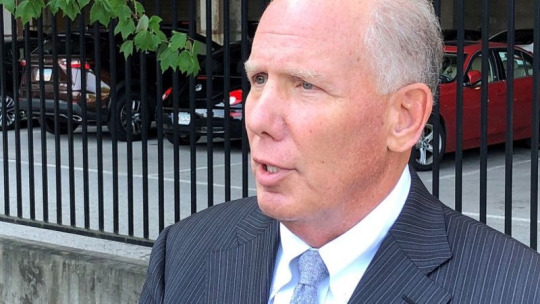
Attorney Steve Sadow said he is willing to defend any doctor throughout the country free of charge. He will only charge travel expenses if he has to travel long distances.
“If a doctor believes that it is appropriate to violate the law, at least as written, I want to be there to defend them because they need somebody in their corner and that is what I do,” he said Friday, hours after the Supreme Court released its opinion.
2. Boy missing for eight days in Germany found alive in sewer

Eight-year-old Joe, who lives in the city of Oldenburg in northwest Germany, disappeared on 17 June from his front garden, sparking a huge police search.
A passer-by heard a soft whimper coming from the direction of a manhole cover in the early hours and called emergency services. Rescuers rushed to the scene around 200m from his home and found Joe at the bottom of the sewer.
A firefighter entered the sewer to bring him out. The child was taken to hospital suffering from hypothermia, but had no major injuries.
3. More Than 200,000 Borrowers Now Qualify for Student Debt Forgiveness
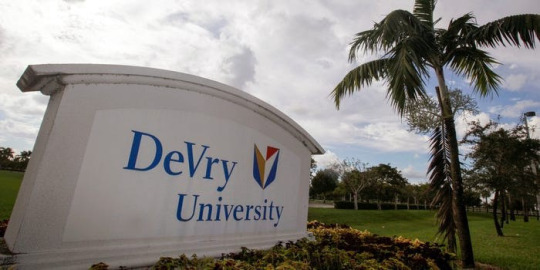
The Department of Education agreed to a $6 billion settlement to cancel debt for 200,000 borrowers. Borrowers will receive a full discharge of their loans, a refund, and credit repair.
An additional 60,000 borrowers will have their cancellation decisions reviewed individually. The settlement stems from a 2019 class action lawsuit, Sweet v. Cardona, which argued many borrower defense claims for loan cancellation were being ignored by the Department of Education.
4. Pride in London: More than a million attend ‘biggest ever parade’

More than a million people have taken part in the 50th anniversary of the UK’s first Pride parade in London. The parade paid homage to the original 1972 march, organised by the Gay Liberation Front (GLF), and saw revellers pass significant sites from the UK’s LGBTQ+ movement.
At the front of the parade, the star of Netflix coming-of-age drama Heartstopper, Joe Locke, said it was an honour to be celebrating “being queer when the world might not be so accepting”.
5. Principal with his students turns Indian school into a green oasis with over 300 plant species

A government primary school in Firozabad’s Keethot village has become a centre of attraction for its lush greenery comprising over 300 species of plants, including a four-foot tall sandalwood tree. Spread over, 5,500 square feet area of school campus, the garden is a result of the efforts of the school headmaster Mohammad Shahid , who with the help of the students, has sown and nurtured plants that bear fruits and flowers, and vegetables used for preparing midday meals for the children.
6. Grand Canyon won’t seek volunteers to kill bison this fall
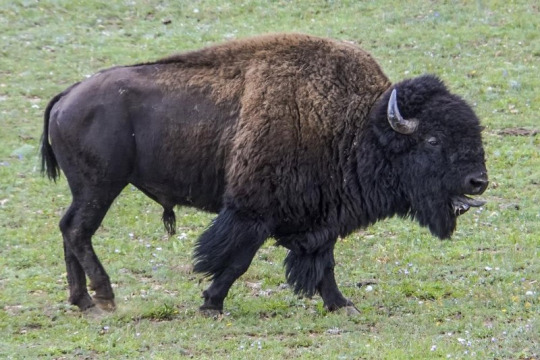
A bison herd that lives almost exclusively in the northern reaches of Grand Canyon National Park won’t be targeted for lethal removal there this fall.
The park used skilled volunteers selected through a highly competitive and controversial lottery last year to kill bison, part of a toolset to downsize the herd that’s been trampling meadows and archaeological sites on the canyon’s North Rim.
Introducing the sound of gunfire and having people close to the bison was meant to nudge the massive animals back to the adjacent forest where they legally could be hunted. But the efforts had little effect. The park is now working with other agencies and groups on a long-term plan for managing the bison, an animal declared America’s national mammal in 2016 and depicted on the National Park Service logo.
7. Kitten rescued from inside Pepsi vending machine at Walmart store

Firefighters responded to a Walmart store in Tennessee to rescue a kitten heard mewing from inside a Pepsi vending machine. “Crews could hear the kitten crying. They unplugged the machine and removed the cover on the back, but couldn’t see the kitten,” the post said.
The firefighters were able to find another opening in the machine and made visual contact with the feline. The rescuers were able to coax the cat to safety. The post said the kitten was adopted by the employee who originally heard the cat’s cries.
. . .
That's it for this week. Until next week, You can follow me on twitter. Also, I have a newsletter :)
Subscribe here to receive a collection of wholesome news every week in your inbox :D
347 notes
·
View notes
Text
Florida has blocked the College Board from testing a pilot Advanced Placement African American Studies (APAAS) curriculum in the state under Governor Ron DeSantis’ “Stop WOKE” Act. According to a letter obtained by National Review, Florida’s Department of Education’s Office of Articulation said the curriculum “is inexplicably contrary to Florida law and significantly lacks educational value.”
The pilot course, which has been tested at 60 schools across the United States, aims to expand the advanced coursework offered by the College Board into the study of the African diaspora in the U.S. The course has run afoul of DeSantis’ widespread ban on teaching “critical race theory” (CRT) in K-12 classrooms. CRT is an analytical framework that seeks to dissect the manner in which racism has shaped American legal theory and institutions. The concept has been co-opted in recent years by right-wing reactionaries to fearmonger about any and all discussions of race and discrimination.
The “Stop Woke” act, signed into law by DeSantis in 2022, essentially prohibits instruction on race relations or diversity that imply a person’s “status as either privileged or oppressed is necessarily determined by his or her race, color, national origin, or sex.” The bill also bans both schools and workplaces from “subjecting any student or employee to training or instruction that espouses, promotes, advances, inculcates, or compels such individuals to believe specified concepts constitutes discrimination based on race, color, sex, or national origin.”
In November, U.S. District Judge Mark E. Walker issued a temporary injunction on a portion of the law that attempted to place similar restrictions on higher education. Despite several challenges to the law on grounds of First Amendment rights, Florida has continued to lead the charge against comprehensive education on the racial history of the U.S. Several other states have passed similar legislation, including Texas, Idaho, Tennessee, South Carolina, and Oklahoma.
DeSantis has centered his administration around governance through culture war grievances. The governor passed a similar law last year, known as the “Don’t Say Gay” bill that granted the state broad powers to implement prohibitions on instruction on issues of gender and sexuality in Florida schools. Under the guise of his anti-CRT crusade, the Governor is reshaping Florida education in the image of the far right, recently announcing a plan to forcibly overhaul the New College of Florida, and transform it into a conservative institution. With increasing pressure on teachers and professors to avoid topics like race and gender lest they face the wrath of the state government, that transformation is effectively taking place though government-enforced censorship.
#us politics#news#2023#rolling stone magazine#rolling stone#Advanced Placement African American Studies#stop wrongs against our kids and employees act#stop w.o.k.e. act#National Review#Florida#department of education#Office of Articulation#African diaspora#Judge Mark E. Walker#critical race theory#don't say gay bill#parental rights in education#gov. ron desantis#conservatives#republicans#gop
97 notes
·
View notes
Text
https://x.com/AfricanArchives/status/1702803593739305429?t=IEuPO-htAKpQUrQ8VMqvKw&s=09

MEET John Morton Finney
John Morton Finney was a Buffalo soldier who fought in World War 1, earned 11 degrees and practiced law until he was 106 years old. He was believed to be the longest practicing attorney in the United States.
—John Morton-Finney (June 25, 1889 January 28, 1998) was an American civil rights activist, lawyer, and educator who earned 11 academic degrees, including 5 law degrees.
—He spent most of his career as an educator and lawyer after serving from 1911 to 1914 in the U.S. Army as a member of the 24th Infantry Regiment, better known as the Buffalo soldiers, and with the American Expeditionary Forces in France during World War I.
—Morton-Finney taught languages at Fisk University in Tennessee and at Lincoln University in Missouri, before moving to Indianapolis, Indiana, where he taught in the Indianapolis Public Schools for forty-seven years.
—Morton-Finney was a member of the original faculty at Indianapolis's Crisps Attucks High School when it opened in 1927 and later became head of its foreign language department. He also taught at Shortridge High School and at other IPS schools.
—Morton-Finney was admitted as a member of the Bar of the Indiana Supreme Court in 1935, as a member of the Bar of the U.S. District Court in 1941, and was admitted to practice before the U.S. Supreme Court in 1972.
17 notes
·
View notes
Text
CHRONOLOGY OF AMERICAN RACE RIOTS AND RACIAL VIOLENCE p.3
1911
National Urban League founded.
1914
Marcus Garvey establishes the Universal Negro Improvement Association (UNIA).
November William Monroe Trotter confronts Woodrow Wilson in the White House over the president’s support for segregation in federal offices.
1915
Debut of the D.W. Griffith film, The Birth of a Nation.
Failure of African American lawsuit against the U.S. Treasury Department for compensation for labor rendered under slavery.
CHRONOLOGY OF AMERICAN RACE RIOTS AND RACIAL VIOLENCE lvii
November William J. Simmons refounds the Ku Klux Klan at Stone Mountain in Georgia.
1916
Madison Grant publishes The Passing of the Great Race, detailing his drastic prescription—including eugenics—to save the white race from being overwhelmed by ‘‘darker races.’’
May Jesse Washington, a seventeen-year-old illiterate black farm hand, is lynched in Waco, Texas.
1917
May–July East St. Louis, Illinois, riots.
August Houston, Texas, mutiny of black soldiers at Camp Logan.
1918
After protesting the lynching of her husband, Mary Turner, then eight months pregnant, is herself brutally lynched in Valdosta, Georgia.
April Congressman Leonidas C. Dyer of Missouri introduces an anti-lynching bill into Congress (the Dyer Anti-Lynching Bill is defeated in 1922).
July Chester and Philadelphia, Pennsylvania, riots.
1919
NAACP publishes Thirty Years of Lynching in the United States: 1889–1918 by Martha Gruening and Helen Boardman.
May Charleston, South Carolina, riot.
Summer Known as ‘‘Red Summer’’ because of the great number of people killed in various race riots around the country.
July Longview, Texas, riot.
Publication of Claude McKay’s sonnet, ‘‘If We Must Die.’’
Chicago, Illinois, riot.
Washington, D.C., riot.
August Knoxville, Tennessee, riot.
September Omaha, Nebraska, riot.
September–
October
Elaine, Arkansas, riot.
1920
Founding of the Commission on Interracial Cooperation, a major interracial reform organization in the South.
1921
April Tulsa, Oklahoma, riot.
1922
Anti-Lynching Crusaders are formed to educate Americans about lynching and work for its elimination.
Chicago Commission on Race Relations issues its influential report on the 1919
Chicago riots.
lviii CHRONOLOGY OF AMERICAN RACE RIOTS AND RACIAL VIOLENCE
1923
January Rosewood, Florida, riot.
February U.S. Supreme Court decision in Moore v. Dempsey leads to eventual release of
twelve African Americans in Arkansas who were convicted in perfunctory mobdominated trials of killing five whites during the Elaine, Arkansas, riots of 1919.
1929
Publication of Walter White’s Rope and Faggot: A Biography of Judge Lynch.
1930
Nation of Islam (Black Muslims) is founded in Detroit, Michigan, by W.D. Fard.
Formation of the Association of Southern Women for the Prevention of Lynching, the first organization of white women opposed to lynching.
October Sainte Genevieve, Missouri, riot.
1931
Scottsboro Case occurs in Alabama; the case comprises a series of trials arising outof allegations that nine African American youths raped two white girls in Scottsboro,
Alabama.
1932
Supreme Court renders a decision in Powell v. Alabama, a case related to the Scottsboro, Alabama, incident of 1931.
1934
Elijah Muhammad assumes leadership of the Nation of Islam.
1935
March Harlem, New York, riot.
1936
First Lady Eleanor Roosevelt addresses the annual conventions of both the NAACP and National Urban League.
1939
Billie Holiday’s first performance of the anti-lynching song Strange Fruit occurs at Cafe´ Society, New York’s only integrated nightclub.
1941
Supreme Court decision in Mitchell v. United States spurs integration of first-class railway carriages.
1942
Congress of Racial Equality (CORE) is founded as the Committee of Racial Equality.
February Double V Campaign is launched to popularize the idea that blacks should fight for
freedom abroad to win freedom at home.
1943
May Mobile, Alabama, riot.
June Beaumont, Texas, riot.
June ‘‘Zoot Suit’’ riots in Los Angeles, California.
July Detroit, Michigan, riot.
August New York City (Harlem) riot.
1944
Publication of Karl Gunnar Myrdal’s An American Dilemma: The Negro Problem and Modern Democracy.
16 notes
·
View notes
Text
AT LEAST 5 KIDS DEAD OR INJURED IN THE SPAN OF A WEEK IN MEMPHIS (MAY 2023)
This week we've seen shockingly young gun violence victims throughout Memphis. Our city is in crumbling from all the pain these constant shootings bring, but little has been done by the government to protect citizens. 282 million dollars went to MPD in 2021, whereas under $232,000 went to the homeless initiative and under 5 million dollars towards housing and community development. Studies show that when taxes are put into funding the well-being and safety of citizens in the sense of housing, education, health care, etc, that crime goes down. Still, Memphis officials and Tennessee government would rather fund millions of dollars into a police department that has proven to be an aggressor than fund avenues that strengthen our city and provide resources to help steer our youth away from crime and gang violence. This incompetence on the governments part is why Memphis remains the murder capital of the USA and one of the top 10 most dangerous cities in the world.
-May 14th, a 17-year-old boy was shot in the head at a gas station on Mt. Moriah road and died on the 18th from his injuries.
-Also on the 14th, a 9 year old girl was shot dead after her 7yr old brother accidentally fired the weapon in South Memphis.
-May 17th a 5 year old boy accidentally fatally shot himself
-May 18th a 16 year old boy was shot and later died from his injuries.
-May 21st a juvenile was shot on South 4th street and Peabody place. He later died in the hospital.
source
Memphistn.gov/finance
Actionnews5.com
#memphis#memphis tennessee#memphis tn#901#memphis news#gun control#gun violence#violent crime#true crime#spread awareness#police reform
6 notes
·
View notes
Text
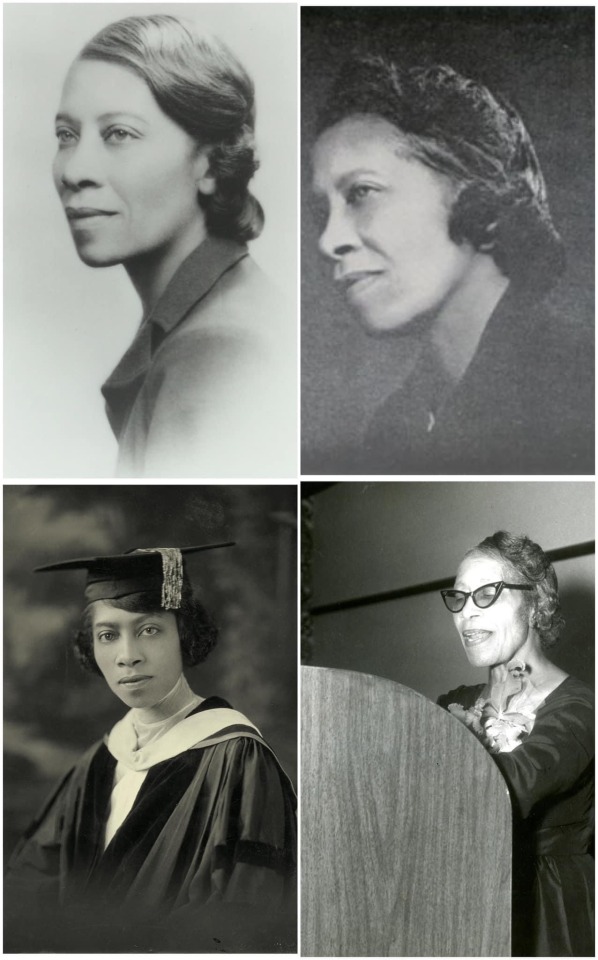
Eva Beatrice Dykes (13 August 1893 – 29 October 1986) was a prominent educator and the third black American woman to be awarded a PhD. (Source)
Dykes was born in Washington, D.C., on August 13, 1893, the daughter of Martha Ann (née Howard) and James Stanley Dykes. She attended M Street High School (later renamed Dunbar High School). She graduated summa cum laude from Howard University with a B.A. in 1914. While attending Howard University, where several family members had studied, Eva was initiated into the Alpha chapter of Delta Sigma Theta. At the end of her last semester she was awarded Alpha Kappa Alpha Sorority Incorporated's first official scholarship. After a short stint of teaching at Walden University in Nashville, Tennessee, Dykes attended Radcliffe College graduating magna cum laude with a second B.A. in 1917 and a M.A in 1918. While at Radcliffe she was elected to Phi Beta Kappa. In 1920 Dykes began teaching at Dunbar High School, and in 1921 she received a PhD from Radcliffe (now a part of Harvard University). Her dissertation was titled “Pope and His influence in America from 1715 to 1815”, and explored the attitudes of Alexander Pope towards slavery and his influence on American writers. Dykes was the first black American woman to complete the requirements for a doctoral degree, however, because Radcliffe College held its graduation ceremonies later in the spring, she was the third to graduate, behind Sadie Tanner Mossell Alexander (1921, University of Pennsylvania) and Georgiana R. Simpson (1921, University of Chicago).
After her graduation from Radcliffe in 1921, Dykes continued to teach at Dunbar High School until 1929 when she returned to Howard University as a member of the English Faculty. An excellent teacher, Dykes won a number of teaching awards during her 15 years of service at Howard University. Her publications include Readings from Negro Authors for Schools and Colleges co-authored with Lorenzo Dow Turner and Otelia Cromwell (1931) and The Negro in English Romantic Thought: Or a Study in Sympathy for the Oppressed (1942). In 1934 Dykes began writing a column in the Seventh-day Adventist periodical Message Magazine, this continued until 1984.
In 1920 Dykes joined the Seventh-day Adventist Church, and in 1944 she joined the faculty of the then small and unaccredited Seventh-day Adventist Oakwood College in Huntsville, Alabama, as the Chair of the English Department. She was the first staff member at Oakwood to hold a doctoral qualification and was instrumental in assisting the college to gain accreditation. Dykes retired in 1968 but returned to Oakwood to teach in 1970 and continued until 1975. In 1973 the Oakwood College library was named in her honor and in 1980 she was made a Professor Emerita. In 1975 the General Conference of the Seventh-day Adventist Church presented Dykes with a Citation of Excellence honouring her for an outstanding contribution to Seventh-day Adventist education. Dykes died in Huntsville on October 29, 1986, at the age of 93.
3 notes
·
View notes
Text
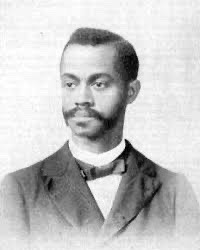
Dr. Charles Henry Turner (February 3, 1867 - February 14, 1923) was a prolific scholar and passionate educator, he made significant contributions to the fields of zoology, entomology, and psychology. He published on not only scientific topics, but civil rights and education, authoring over seventy articles in total. He served as a civic leader in the St. Louis African American community.
Born in Cincinnati, he graduated as valedictorian of his high school class. His parents, Thomas Turner, a custodian, and Addie Turner, a nurse. In 1887, he married Leontine Troy and they had three children. After Leontine’s death (1894), he married Lillian Porter until his passing.
He earned a BS in Biology from the University of Cincinnati, followed by an MS. He published an article in the journal Science, likely making him the first African American to have a paper appear in that publication. He contributed dozens of pieces to scientific journals on subjects as diverse as avian morphology and the behavior of ants.
He served as a Professor of Biology and Chair of the Science Department at Clark University. He became a high school principal in Cleveland, Tennessee before accepting a position as Professor of Biology and Chemistry at Haynes Normal and Industrial Institute. He moved to St. Louis and joined the faculty of Sumner High School, until his retirement in 1922.
He earned a Ph.D. (magna cum laude) in Zoology from the University of Chicago in Illinois. He was one of the first African Americans to earn a doctorate in the biological sciences, as well as one of the first African American Ph.D. alumni.
He investigated avian brain structure and aquatic invertebrates. He analyzed the “homing” mechanism in ants. He documented that ants make a specific type of circling or gyration before returning to their nests—a discovery that bears his name, Turner Circling. His study of entomology would grow still more complex, despite the challenge of working with little institutional support. He was called upon to contribute review articles to journals and other scientific publications.
He contributed time and energy to local civic organizations. #africanhistory365 #africanexcellence
1 note
·
View note
Note
7
Tennessee and Kentucky. My favorite.
... Though West Virginia and Department of Education wouldn't be too bad either
2 notes
·
View notes
Text
The Legality of Human Bones and Skeletons for Sale
In the United States, there are several ethical concerns regarding the trade in human remains. This article explores the legality of human bones and skulls for sale and outlines the ethical considerations involved in the trade. You'll also learn about the sources of human remains and the demand for skeletal specimens for medical research and education.
Legality of owning and trading human remains in the United States
Many states have laws governing the commodification of human remains, but these laws are complicated and hard to interpret. An attorney at the Louisiana Department of Justice said the laws are extremely complex and ambiguous. Moreover, there is no centralized resource on the Internet that allows researchers to examine the legality of owning and trading human remains state-by-state. Hence, academics are unable to give concrete examples of state laws.

The legality of owning and trading human remains is an important issue. Though some states have banned this practice, it is still legal in other states. The trade in human remains is an example of a form of unlicensed trade and has many negative aspects. It is highly recommended that individuals avoid such businesses.
While federal law does not prohibit the trade or ownership of human remains, a few states have laws restricting the import and export of human bones and skulls. In New York, Georgia and Tennessee, the sale or import of human remains is illegal. This also applies to Native American remains. Native American remains are protected by the Native American Graves Protection and Repatriation Act.
Sources of human remains
The global human remains trade is driven by the growing demand of medical schools and private collectors. However, there are a few key issues that make the trade problematic. First of all, it perpetuates cultural practices and disrespect for the dead. Second, it revives a dark Colonial era practice of bone-collecting. Third, there are reports of grave-robbery. In some cases, people steal human remains to sell them for a profit.
The industry is often corrupt and involves the powerful collecting the powerless. Most of the time, these bones are from Indigenous and Brown people. Other times, they are taken from graves or sacred sites. In addition, the trade often involves scientific racism and filling medical schools. And third, there are ethical issues involved.
Human remains trade is also linked to grave-robbing. This practice is illegal unless someone has a license to disturb graves.
Demand for skeletons in medical education
Skeletons are used by medical students to conduct practical experiments and examinations. There is a high demand for human skeletons from overseas institutions and colleges. A doctor based in Kolkata said that the medical schools in India were unable to meet the growing demand for skeletons. However, some Indian skeletons have been exported to Thailand and Japan.
Skeletons have long been used in medical education. In the Renaissance, Andreas Vesalius, a hotshot Renaissance scientist, published his famous book De humani corporis fabrica before he was thirty. Vesalius was a skeptic of the medical establishment and regarded skeleton-making as a dirty and difficult task.
Skeletons are an essential part of the medical education process. Students spend 18 months studying human anatomy and undergo exams worth 500 marks to test their knowledge. There are dozens of public and private medical colleges in India. A total of 13 public medical colleges offer about 3,162 seats to students pursuing the BDS course. There are also nine private dental colleges with about 1,280 seats.
Ethics of collecting human skulls
A London curiosity shop is trying to crowdfund the purchase of a Peruvian mummy. Although not King Tut, this mummy is likely an adult. It has been described as "crunchy" by one museum visitor. The shop also offers other objects made from human remains, including Ouija board planchettes and wallets.

The ethics of collecting Human Bones for Sale skulls are complicated. While some auction houses have banned the sale of body parts, this practice continues to occur in many prestigious auction houses. Despite the fact that dry human remains can be easily transported and stored, the danger of selling human remains is real. Unfortunately, cases like Parker's skull will occur again. The skull was removed from the body of a criminal.
Although there are no federal laws prohibiting the sale of human remains, there are many laws designed to protect the dead's dignity. One such law is in the Canadian Criminal Code, sections 182: "Dignity of the dead."
3 notes
·
View notes